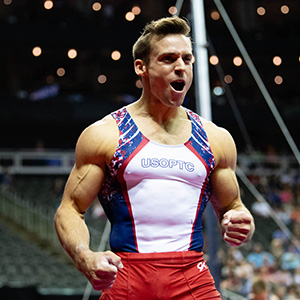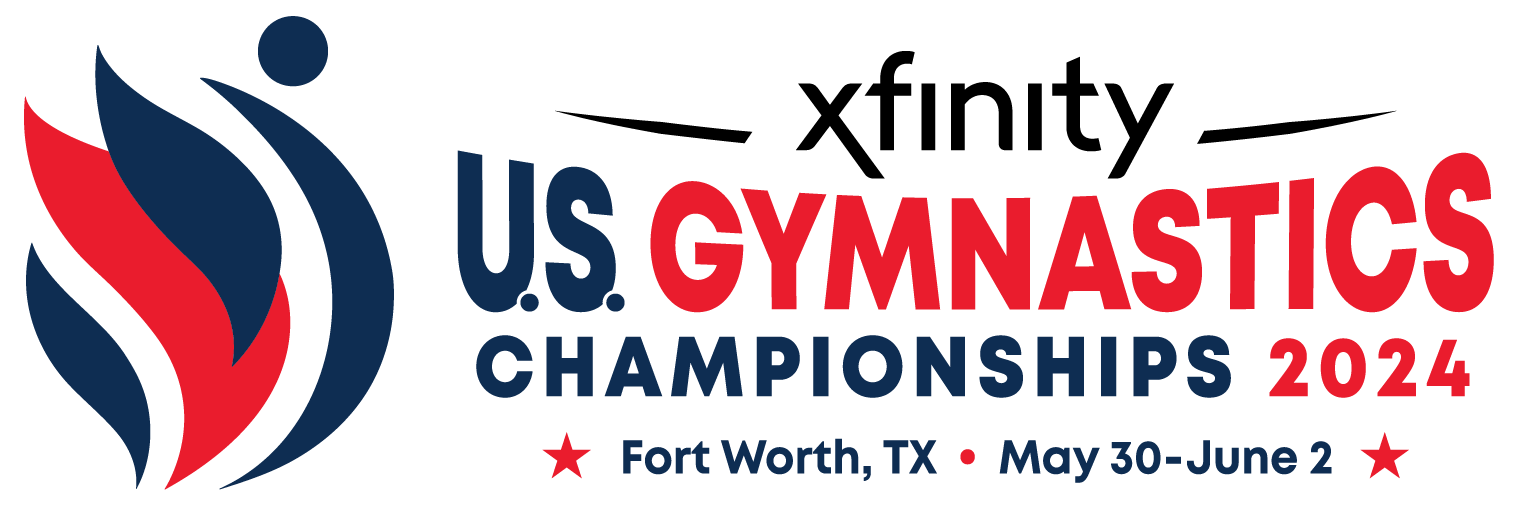Mikulak notches super six at U.S. Championships

- Senior Men’s Results: All-Around | Events
- Junior 15-16 Results: All-Around | Events
- Junior 17-18 Results: All-Around | Events
- Photo Galleries
- Routines: Senior (in the U.S.) | Senior (outside the U.S.) | Junior
- Recap
By Blythe Lawrence
Getting the six was sweet for Sam Mikulak on the final night of men’s competition at the U.S. Championships, but the 12 was even better.
Mikulak cruised to his sixth U.S. all-around title in seven years Saturday night at Sprint Center in Kansas City, Mo., becoming the first male gymnast in half a century to win half a dozen U.S. Championships. But it was the way he went about it — hitting 12 out of 12 routines to turn in an error-free performance over the two days of competition, the first he’s ever delivered at the senior national championships — that brought out the toothpaste commercial grin on the 26-year-old’s face as he took questions from the media afterward.
“This one feels the best, I’ll say that,” commented Mikulak, whose two-day all-around total of 174.150 points was his largest-ever margin of victory, 5.5 points ahead of runner up Yul Moldauer. “I feel so much more comfortable. Back in the day I was working through a lot of tweaks and trying to figure out a lot for myself personally, and just how to get my head into the right state of mind for these competitions. Having last year, I felt like I finally got a rhythm, and here I’ve just been able to perfect it a little more, and I just feel like it’s going to keep getting better and better.”
Talent and resilience have always been front and center on Mikulak’s gymnastics CV. This is a man who made his first Olympic team in 2012, a year after fracturing both of his ankles landing a tumbling pass gone awry. Unable to train his best events, Mikulak used the opportunity to get better on pommel horse, where he now has a skill named for him, and still rings, which is today one of his most dependable routines.
But questions of consistency have dogged him in recent years, where the 26-year-old has time and again been unable to convert opportunity into success on the international stage. The breakthrough came at last year’s World Championships, where he helped the U.S. men’s team attain fourth place and finished in the top five in four event finals, pocketing a long-awaited individual medal, a bronze, on high bar.
What changed? “Honestly, I do less [in training, but] more dedicated and perfect turns,” Mikulak said. “I listen to my body., I’ve got great communication with my coach. I don’t take chances with my body, which is the thing I used to not do. I used to grind, push, make sure that you’re getting all the tasks done for the day, and honestly, it’s give or take. I’m just letting my body be in a healthy state, and then my potential’s at its highest.”
Nobody was able to come near him in Missouri. After a six-for-six performance in the first round on Thursday, Mikulak, who trains at the U.S. Olympic and Paralympic Training Center in Colorado Springs under Andriy Stepanchenko, held a 2.75 point lead over 2017 champion Yul Moldauer.
With every hit routine he recorded Saturday, the lead kept expanding, and by the time he closed out the evening with a stuck double twisting double- tuck dismount off the rings, Mikulak had left no chance for anyone to challenge. Of the rest of the pack, Moldauer came closest, second- place finishes on floor exercise and parallel bars, giving him silver- medal status for the second consecutive year.
“I didn’t expect to do that well here,” said Moldauer, who was limited by an elbow injury that caused him to miss about six weeks of training, leaving the Oklahoma senior wondering where he would place in the field. “There are a lot of great guys,” he commented. “Getting second is good, but I feel we should all be pushing to be more competitive with Sam. I think if we do that, we’ll grow as a country. There’s this kind of reality check — Sam won by 5.5 points so it just really shows we have to improve in a lot of areas to be competitive as a country.”
Moldauer’s total edged Stanford alum Akash Modi by 0.35. Twenty-four-year-old Modi, a cousin of 2008 Olympic team bronze- medalist Raj Bhavsar, professed himself happy to finally win an all-around medal after being fourth in 2016 and 2017.
“I just come in and try to do the best I can and see where I am,” Modi said. “Today was very good, but I kind of missed out on some bigger scores that I think I have potential to [get]. On pommel horse and parallel bars, I can definitely go up five- or six- tenths each.”
Shane Wiskus of the University of Minnesota flirted with the podium throughout the competition and ultimately finished fourth, though not without signalling what he can do. Video of Wiskus’s one-armed catch of his uber-difficult Cassina release move on high bar has already gone viral and may end up as the enduring image of the meet.
Despite keeping near perfect form throughout the skill, leading some to believe he’d done it that way on purpose, Wiskus said the one- arm grab of the bar wasn’t exactly intentional.
“I’ve actually done it a few times in the gym, not gonna lie,” Wiskus said. “I was really hoping it wasn’t going to happen this weekend, but at least I practice it and I was ready for the catch.”
In addition to the top four, Trevor Howard and Allan Bower, fifth and sixth respectively, were added to the national team. The field was without 2018 World team members Alec Yoder and Colin van Wicklen, who are recovering from injury, as well as NCAA champion Brody Malone, who competed at last week’s Pan American Games in Lima, where the U.S. men earned silver.
Despite Mikulak’s margin of victory, the U.S. men seem plenty deep heading into the selection process that will choose the team that will compete at October’s World Championships, where the Americans will aim to qualify a team to next year’s Olympic Games.
“You don’t want to go to Worlds and relax,” Moldauer said. “You want to go to Worlds and play the game. As a country, we’re trying to do everything we can do. We’re in a good progression zone right now.”

